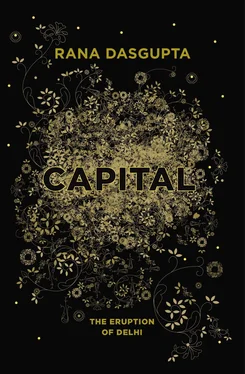There is a great precision of detail in their stories of construction. They know how to make a sewer or a doorway, and they know how much cement and how many bricks such things take. If these women are so imposing, in fact, it has something to do with the fact that no part of their lives is delegated. They are not specialised. They are their own builders, town planners and politicians. They have an intimate and comprehensive understanding of all those aspects of life that remain vague and remote to other people. They seem to own themselves in a way that most people I know do not.
Jahanara tells a similar story. When she came to Delhi, she settled in the Muslim slum around Nizamuddin.
“There is a big well there and we lived near it. There was a vacant area at that time and the local boss built a slum with the help of the local police. First we had a tea stall. Soon the place became lively and we made a makeshift hotel there. We had water and electricity, and because Nizamuddin railway station was very near, a lot of people came to eat in our hotel.
“Then they came to us to say that whatever good you do and whatever money you make here, you will always be called slum people. They told us they were going to take us to a new place which would have good schools, parks, water and electricity. We were told that we would have our own house in this place with toilets and bathrooms. Our children were very happy. We didn’t know at that time that it was all a lie.
“They asked to break down the houses we had built with our own hands. There were some among us who said they didn’t trust the promises this boss was making. But one night around 3 a.m. he broke down his own three-storey house with his own hands. People started to panic. They said, ‘If the government officials come to demolish our houses we will lose all our belongings in the mess. It’s better if we demolish them ourselves.’ So we did. Then they loaded our belongings into a truck and threw us here.”
The pitch of our conversation is curiously tranquil. It is a beautiful morning and the women speak calmly, affirming each other’s accounts here and there as if each one spoke for the other. One senses that they are together in a way that few middle-class people are. Precariousness is so much the defining quality of their lives that mutuality is the only form of survival, and even in their grammar the ‘I’ rarely breaks ranks with the ‘we’.
Meenakshi shows me files full of the letters and photographs they have sent off to various government departments in their attempt to make Bhalswa liveable.
“It’s still going on after ten years. We still do not have some of the most basic things. We are still lobbying for ration cards. These are the most important thing in anybody’s life. If they have rations, they can at least eat bread, even if it is just with salt. Without this they cannot survive. You know what the inflation rate is at present? They cannot afford to buy anything from the open market.
“These things actually irritate you. Each time we walk into the office of the Municipal Corporation, the bureaucrat there wrinkles his face in disgust and says, ‘Why does this garbage keep coming back to me?’ How long can you go on fighting with that? The people here can either spend their days fighting for water or they can do their daily work and earn some money for their families.
“I have found out that the government spends 56,000 rupees [$1,200] per month providing water tankers to us. That’s nearly 7 lakhs [$14,000] a year. It would take just half of that amount to make a proper pipeline into this settlement. But they don’t want to do that. They know that without water this will never be a proper settlement, and they will be able to move everyone out again.”
For most middle-class families, government has retreated drastically from social and economic life over the last two decades, to the point that they hardly see it anymore. They like it like this: they idealise government withdrawal and ‘deregulation’. Many of them do not realise how much work the city government does to protect their class from the enormous mass of poverty that surrounds them, which is firmly prevented from having any claim on city space or resources. It is the poor who understand how the city is truly managed. They have a far greater intimacy with government and, indeed, a far greater bureaucratic burden. As I understand, looking through these files: the work Meenakshi has taken on is monumental.
In the house opposite, a man emerges into the room, the husband of the woman in the pink sari. He is wrapped in a towel, his chest bare. He is muscular, with thick, wild hair and a silver necklace shining against his dark skin. He is heavy with sleep and moves slowly. He comes to sit on the steps outside. The rings on his fingers glint in the sun.
“It has been difficult for the men,” says Meenakshi. “They all lost their jobs when they came here. No one wants to employ men for domestic work. Nowadays there is some daily work that the men can do. They shell peas, for instance. That gives them 30 rupees [$0.60] for a day’s work, and that is usually with the help of the whole family. Some men make brooms and sell them the residential areas nearby. Some have started working on construction sites. But that’s not the majority.
“So most of them sit at home, and they get depressed. Their minds get completely blocked. They resent their wives who are always away working. They beat them. They don’t like them getting involved in political work: they turn up at our meetings drunk and abusive. They shout at us: ‘You women can’t do anything. You can’t change a thing.’
“And this community is badly affected by drugs. I am not talking about one or two families, I am talking about the whole community. Even children are affected. They don’t have school so they don’t have anything to do and slowly they get affected. They sniff the glue which is used to make shoes. There is a tablet that costs one rupee and it makes children forget everything that is happening. The cheapest drugs give them the utmost happiness.
“The men drink and they smoke brown sugar. As soon as they see their wives with any money, they take it to buy drink. They come home with their bottles hidden in their clothes. I ask them, ‘Do you really want to buy that bottle when you don’t have any food to eat in your home?’”
Saraswati says sarcastically, “The government is doing a wonderful job here. They haven’t started any hospitals or schools but they instantly opened a liquor store. They even posted a policeman to guard it. Schools cost the government money but liquor stores give them revenues.
“People say we are always blaming the government. Why would we not blame them? The things on which our life depends, the government is taking away from us. And the things that can kill us, the things which make our homes bankrupt, the government is opening new shops to provide those things. It is providing those things very generously.”
In the house opposite, the girl in the pink sari has taken delivery of many hundred newly made plastic brooms, which she is now wrapping individually in plastic sleeves. Her husband is sitting on the steps outside smoking.
Meenakshi says, “So here is the thing. You can see the streets and houses that people have made here. After ten years they now have something of value. But now the government has declared this place illegal and says they have to leave. The land which was provided by the government is now illegal. Because they only gave them permission for ten years. They will not give poor people a permanent place in the city.”
“When you came here, you must have walked across the empty land,” says Saraswati. “Now the government wants to build flats on that land, and they want to get us out. Why do they want to build flats there? Because we have spent ten years making this place habitable. We are the ones who drained the land, who built the streets, who organised the electricity supply, who got the buses to run here. It is we who have made this land valuable enough for the government to sell. We will not leave it. We have built two cities already in our lives and we will not build another.”
Читать дальше











